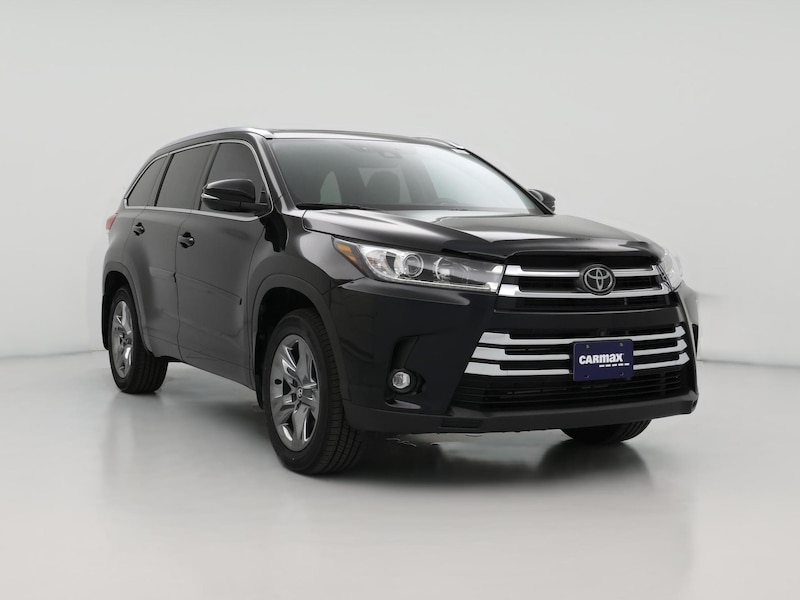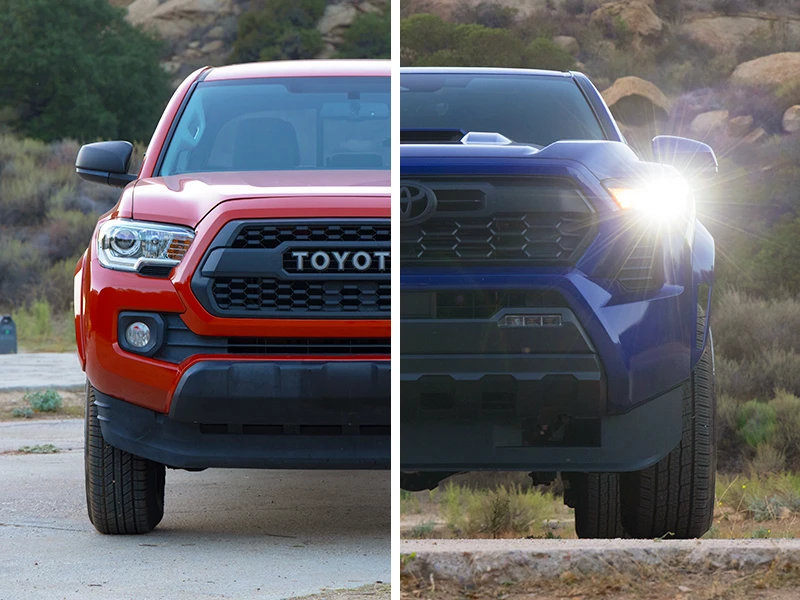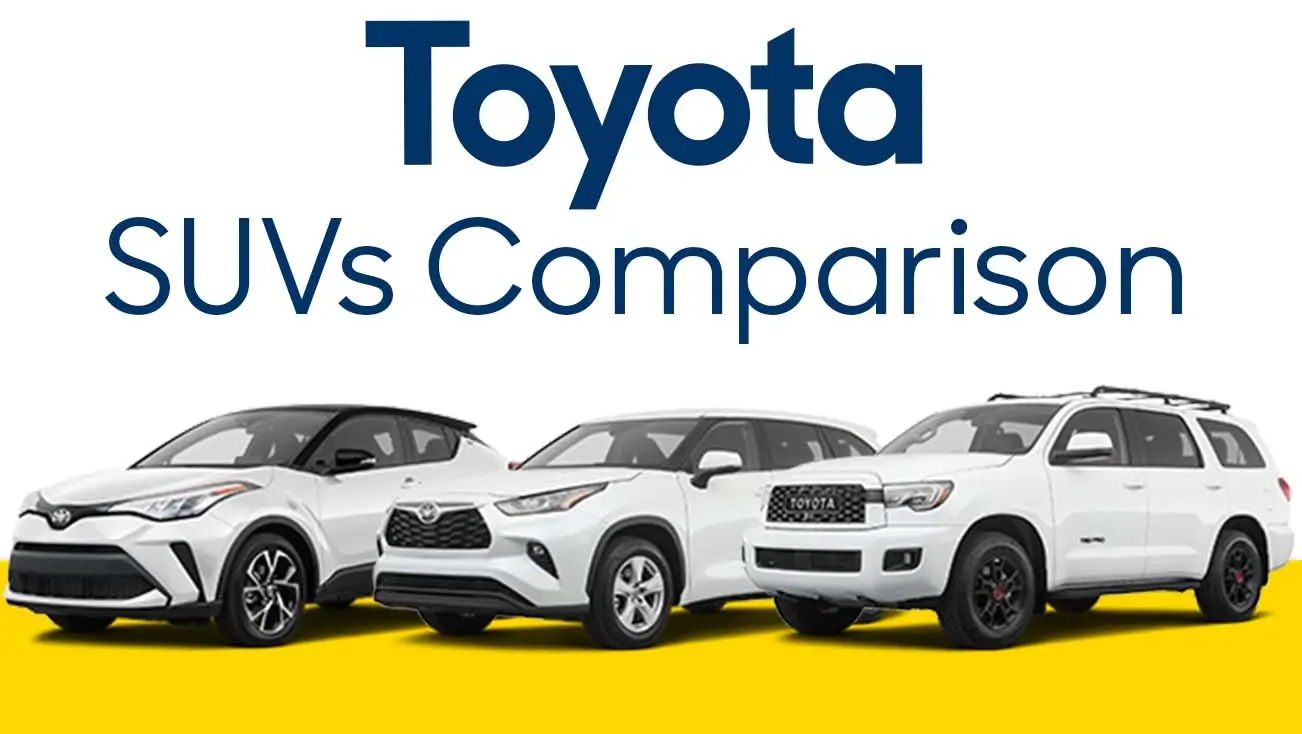
Discover the SUV that's right for you.
Toyota's SUV lineup has evolved over the last decade. Models like the FJ Cruiser (discontinued in 2014) and Venza (discontinued in 2015) paved the path for today's sought-after SUVs. From the city-slicking C-HR and compact RAV4, to the three-row Highlander and Sequoia, to the off-roading 4Runner and Land Cruiser, there is a Toyota SUV to cover your bases.
Want to see how SUVs from other brands compare? Take a look at these two articles:
If you're wondering which Toyota SUV is right for you, read on as we review these six popular models in our Toyota SUVs comparison. Here's what you'll learn:
Features and Trim Options
All six Toyota SUVs offer a nice range of features across their trim levels. The two-row C-HR is the smallest of the group, with the RAV4 trailing close behind. The Highlander and the 4Runner are bigger, with three rows of seating, while the Land Cruiser and Sequoia top the charts for interior room and cargo space.
Toyota C-HR
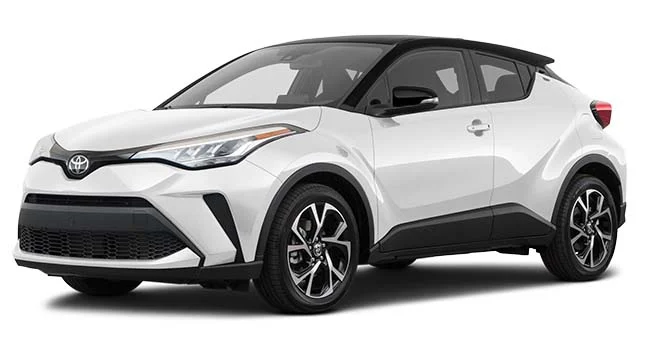
The smallest of the bunch, the Toyota C-HR is a subcompact crossover with sporty handling and thrifty fuel economy. All 2018-2020 models use a 144-hp, 2.0L four-cylinder engine that returns 27 mpg city and 31 mpg highway, making it a great choice for commuting.1
The C-HR's small footprint and compact turning circle can also provide easy handling through tight spaces and heavy traffic. The suspension system glides over bumps for a comfortable ride, while the steering system is responsive on twisty roads. With 19 cubic feet of cargo space behind the second row, this crossover has plenty of room for groceries and luggage (2018-2020 models).
Here's what you can expect on all 2018-2020 Toyota C-HR models:
Rear spoiler
Dual-zone automatic climate control
Eight-inch touchscreen
Bluetooth® connectivity
Pre-collision system with pedestrian detection
Lane departure alert with steering assist
Toyota RAV4
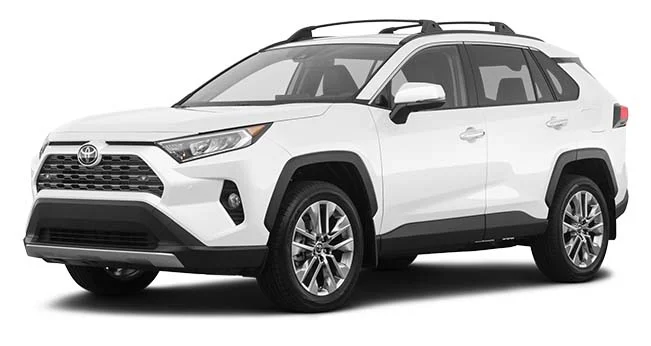
The Toyota RAV4 is a compact SUV that's great for commuting, running errands, or enjoying road trips. 2017-2020 models come equipped with a 2.5L four-cylinder engine, but hybrid versions pair an electric motor and a battery with the gas engine to get more miles to the gallon. Available with all-wheel drive, the 2017-2020 RAV4 is designed to provide excellent traction in slippery and snowy conditions.
With 38.4 cubic feet of cargo volume for groceries and golf clubs, the 2017-2018 RAV4 is also a practical choice. If you're looking for premium touches, check out the Limited trim with its 19-inch chrome-finished alloy wheels, SofTex®-trimmed heated front seats, and Entune™ 3.0 Premium Audio with an eight-inch touchscreen and navigation.
Here's what you can expect on all 2017-2020 Toyota RAV4 models:
Roof rails (optional for 2018)
Integrated fog lights (from XLE trim)
Power outside mirrors with folding feature
Available all-wheel drive
Backup camera with projected path
Pre-collision system with pedestrian detection
Toyota Highlander
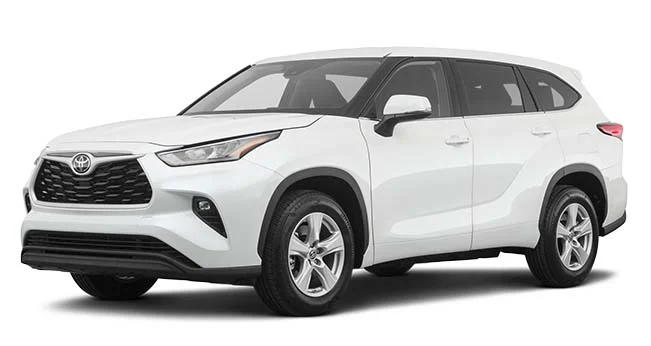
The Toyota Highlander is a midsize SUV with comfortable seating for seven or eight passengers, which is great for big families and groups. 2017-2019 models start with a 185-hp, 2.7L four-cylinder engine, but stepping up to the LE Plus trim unlocks a 295-hp, 3.5L V6 that can tow an estimated 5,000 lbs. when properly equipped.2
A hybrid version is also available for 2017-2020 models, if you want less stops at the pump. Not only does it have great towing capabilities, but the Highlander also has a nearly flat floor that can carry 83.7 cubic feet of belongings and larger items. For extra comfort and convenience, look for the XLE trim with leather upholstery in the first and second rows, a large moonroof with sunshade, and heated front seats to cut the chill (2017-2019 models).
Here's what you can expect on all 2017-2020 Toyota Highlander models:
LED taillights and stop lights
Color-keyed heated power outside mirrors
Soft-touch in-dash shelf
Five USB ports
Integrated backup camera with projected path
Second- and third-row 60/40 split, sliding, and reclining fold-flat seating
Toyota 4Runner
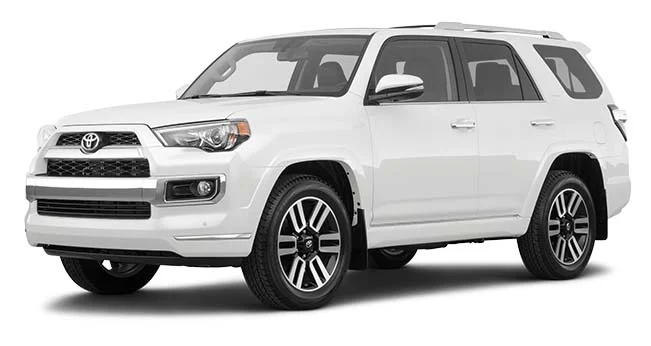
The Toyota 4Runner is a roomy and capable midsize SUV for those who enjoy the outdoors. 2017-2020 models come standard with five-passenger seating, but an optional third row expands seating capacity to seven. Featuring a tough body-on-frame design, a 4.0L V6 with 270 hp and 278 lb-ft of torque, and part-time 4WD with Active Traction Control (standard on TRD models), this 2017-2019 SUV can quench your thirst for adventure on off-road trails.
An integrated tow-hitch receiver and wiring harness also come standard on all 2017-2020 4Runners, allowing the SUV to tow an estimated 5,000 lbs. when properly equipped.2 There's also an optional sliding rear cargo deck and 88 cubic feet of cargo volume in 2017-2020 models, providing lots of space to store camping equipment and outdoor gear.
Here's what you can expect on all 2017-2020 Toyota 4Runner models:
Integrated fog lights (2018-2020 only)
Backup camera with projected path
6.1-inch touchscreen display
Tilt/telescopic steering wheel
Bluetooth connectivity
Optional running boards
Toyota Sequoia
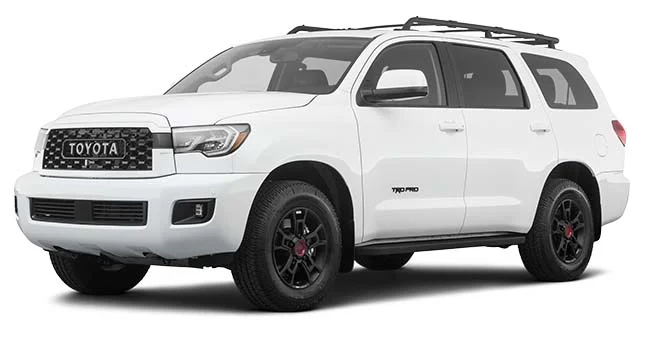
One step above the 4Runner is its bigger sibling, the Toyota Sequoia. This 2017-2020 truck-based SUV includes three rows of seating for eight passengers, and an adult-friendly third row with 35.3 inches of legroom. With its 5.7L V8 engine with 381 hp and 401 lb-ft of torque, the 2017-2020 Sequoia can tow an estimated 7,400 lbs., when properly equipped.2 Cargo capacity is equally impressive, with 120.1 cubic feet of storage with the two rear rows folded (2017-2020 models).
All 2017-2020 trims feature a four-wheel independent suspension that glides over uneven terrain, while the optional 4WD system is designed to provide skilled handling in tough conditions.
Here's what you can expect on all 2017-2020 Toyota Sequoia models:
Integrated fog lights
Power tilt/slide moonroof with sliding sunshade
Color-keyed heated power outside mirrors
Automatic three-zone front and rear climate control
Multifunction center console with two front and two rear cup holders
Two 12V auxiliary power outlets
Toyota Land Cruiser
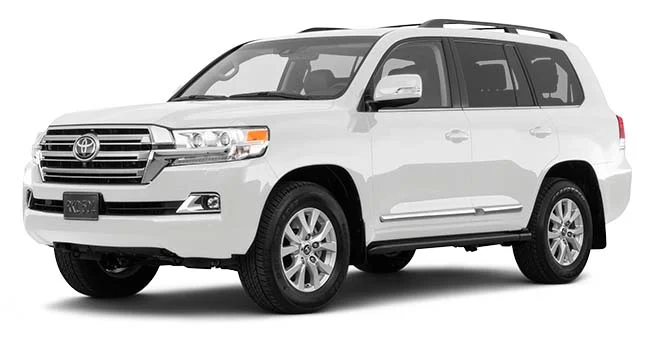
The Toyota Land Cruiser is a large and luxurious three-row SUV with seating for eight passengers. Available as a single trim, 2017-2020 models come fully loaded with a 14-speaker sound system, sunroof, four-zone automatic climate control, leather upholstery, and heated and ventilated power-adjustable front seats.
Anchoring the 2017-2020 Land Cruiser is a powerful 381-hp, 5.7L V8 engine with an eight-speed automatic transmission and full-time 4WD with a lockable center differential. When properly equipped, towing capacity is an estimated 8,100 lbs., which is the strongest in Toyota's SUV lineup.2 Standard hill descent control, crawl control, and selectable multi-terrain modes also make the 2017-2020 Land Cruiser an ideal off-roader.
Here's what you can expect on all 2017-2020 Toyota Land Cruiser models:
18-inch alloy wheels
Skid plates on front suspension, radiator, fuel tank, and transfer case
Perforated leather-trimmed seating surfaces
Entune Premium JBL® Audio with integrated navigation
Integrated backup camera with projected path
Bluetooth connectivity
Engine Options
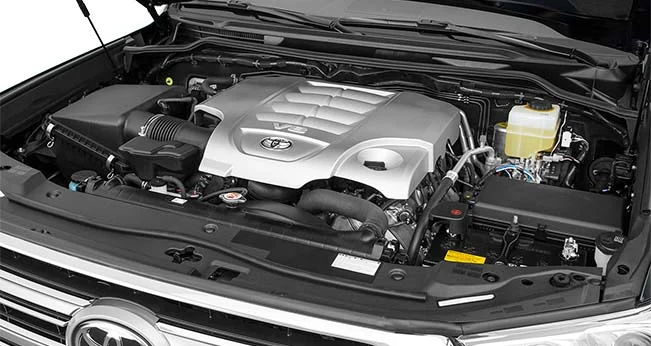
Toyota keeps its engine options streamlined across its SUV lineup.
The 2018-2020 C-HR keeps it simple with a singular engine option: a 144-hp, 2.0L four-cylinder.
The 2017-2020 RAV4 comes with a couple more engine choices. All trim levels include a 2.5L four-cylinder engine, but hybrid versions pair an electric motor-generator and a battery with the gas engine.
Then, there's the 2017-2019 Highlander. This three-row SUV comes standard with a 2.7L four-cylinder engine with 185 hp and 184 lb-ft of torque. LE Plus and higher trims include a 295-hp, 3.5L V6, which is also found in hybrid versions that add an electric motor-generator and battery.
Like the C-HR, the 2017-2020 4Runner also has a singular engine option: a 270-hp, 2.0L four-cylinder.
Lastly, both the 2017-2020 Toyota Sequoia and Land Cruiser share the same engine: a 5.7L V8 that produces 381 hp and 401 lb-ft of torque.
Fuel Economy
You'll find decent fuel economy across all six vehicles. The two smaller SUVs—the RAV4 and C-HR—do a little better on mpg due to their size, as does the Highlander with its hybrid powertrain.
2019 Toyota C-HR
With the 2.0L engine, front-wheel-drive models get an EPA-estimated 29 mpg combined.1
2019 Toyota RAV4
With the 2.5L engine, all-wheel-drive hybrid models get an EPA-estimated 40 mpg combined.1
With the 2.5L engine, all-wheel-drive models with stop-start get an EPA-estimated 30 mpg combined.1
With the 2.5L engine, front-wheel-drive models get an EPA-estimated 30 mpg combined.1
With the 2.5L engine, all-wheel-drive models get an EPA-estimated 28 mpg combined.1
2019 Toyota Highlander
With the 2.7L engine, front-wheel-drive models get an EPA-estimated 22 mpg combined.1
With the 3.5L engine, all-wheel-drive hybrid LE Plus models get an EPA-estimated 29 mpg combined.1
With the 3.5L engine, all-wheel-drive hybrid models get an EPA-estimated 28 mpg combined.1
With the 3.5L engine, all-wheel-drive LE models get an EPA-estimated 23 mpg combined.1
With the 3.5L engine, all-wheel-drive models get an EPA-estimated 22 mpg combined.1
With the 3.5L engine, front-wheel-drive models get an EPA-estimated 23 mpg combined.1
2019 Toyota 4Runner
With the 4.0L engine, two-wheel-drive and four-wheel-drive models get an EPA-estimated 18 mpg combined.1
2019 Toyota Sequoia
With the 5.7L engine, two-wheel-drive models get an EPA-estimated 15 mpg combined.1
With the 5.7L engine, four-wheel-drive models get an EPA-estimated 14 mpg combined.1
2019 Toyota Land Cruiser
With the 5.7L engine, four-wheel-drive models get an EPA-estimated 15 mpg combined.1
Tech Features
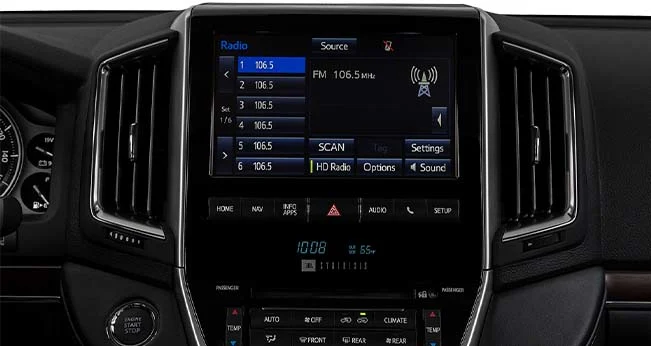
All Toyota SUVs benefit from a range of tech features and driving aids, many of which are found right at the base level. Here's what you can expect in each Toyota SUV base trim.
2019 Toyota C-HR
4.2-inch multi-information display
Eight-inch touchscreen with integrated backup camera display
Entune 3.0 Audio
Pre-collision system with pedestrian detection
Lane departure alert with steering assist
Dynamic radar cruise control
2019 Toyota RAV4
Entune 3.0 Audio with seven-inch touchscreen display
One USB media port
Integrated backup camera with projected path
Pre-collision system with pedestrian detection
Lane departure alert with steering assist
Dynamic radar cruise control
2019 Toyota Highlander
Entune Audio with 6.1-inch touchscreen display
Five USB ports
Bluetooth connectivity
Pre-collision system with pedestrian detection
Lane departure alert with steering assist
Dynamic radar cruise control
2019 Toyota 4Runner
Entune Audio Plus system with 6.1-inch touchscreen display
One USB port
Bluetooth connectivity
Backup camera with projected path
Siri® Eyes Free
Optional navigation system
2019 Toyota Sequoia
Two 12V auxiliary power outlets
Pre-collision system with pedestrian detection
Lane departure alert with sway warning system
Dynamic radar cruise control
Blind-spot monitoring system
Optional navigation system
2019 Toyota Land Cruiser
Entune Premium JBL Audio with integrated navigation
Integrated backup camera with projected path
Bluetooth connectivity
Optional rear-seat DVD entertainment system
Enhanced multi-terrain monitor
Dynamic Radar Cruise Control
Cargo Space
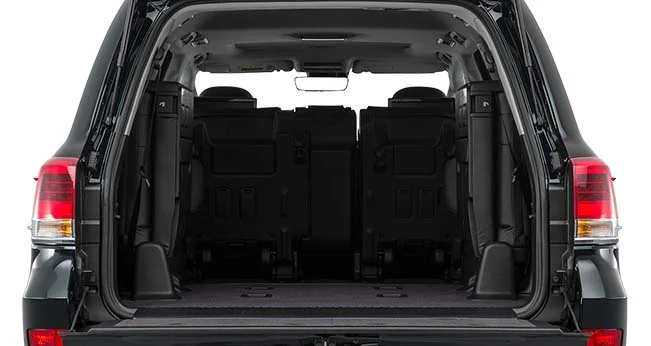
Though the C-HR is the smallest SUV in Toyota's lineup, it still offers lots of storage for personal items, including door pockets, cup holders, and a center console. With all rows in place, 2018-2020 models offer 19 cubic feet of cargo volume; folding the second row reveals 36.4 cu ft.
Next up is the 2019-2020 RAV4, which features plenty of room for five passengers and their things. Behind the second row is 37.5 cubic feet of volume, or 69.8 cu ft with it folded. This makes the RAV4 a practical choice for carrying luggage and sporting gear.
When stepping up to a three-row Toyota SUV, you can expect generous cargo space. With all rows occupied, the 2017-2019 Highlander has 13.8 cubic feet of volume for groceries and school bags. Folding the third row increases capacity to 42.3 cubic feet, which is enough room to fit a stroller and related gear. When all rows are folded, the 2019 Highlander has a nearly flat floor that can carry 83.7 cubic feet of materials from the home improvement store.
The 2018-2020 4Runner's squared-off cargo area is ideal for longer camping trips. With a maximum of 88.8 cubic feet of cargo room, you can fold down the seats and roll out your sleeping mat. The rear power window can also be lowered to easily reach your belongings without opening the liftgate. Behind the second row, the 4Runner features 46.3 cubic feet of cargo volume and 9 cubic feet behind the third row.
Tipping the scales is the 2017-2020 Sequoia, which boasts 120.1 cubic feet of cargo volume with all rows folded. Even with some seats in place, you'll have 66.6 cubic feet with the third row folded and 18.9 cubic feet with it upright. From groceries and school bags to luggage, coolers, and even a surfboard, the Sequoia has the versatile space you need.
The 2017-2019 Land Cruiser is bigger still, with 16.1 cubic feet behind the third row, 43 cu ft behind the second row, and a maximum cargo capacity of 81.7 cu ft. Go for the Land Cruiser if you want lots of flexibility for a weekend's worth of camping gear.

See below for average CarMax prices for various model years of all six Toyota SUVs.3
Toyota C-HR
2018 - Average prices less than $19,0003
2019 - Average prices less than $20,5003
2020 - Average prices less than $22,0003
Toyota RAV4
2016 - Average prices less than $19,5003
2017 - Average prices less than $20,5003
2018 - Average prices less than $22,0003
2019 - Average prices less than $27,0003
2020 - Average prices less than $27,5003
Toyota Highlander
2016 - Average prices less than $26,5003
2017 - Average prices less than $28,5003
2018 - Average prices less than $30,5003
2019 - Average prices less than $32,0003
2020 - Average prices less than $37,5003
Toyota 4Runner
2016 - Average prices less than $32,5003
2017 - Average prices less than $34,0003
2018 - Average prices less than $36,0003
2019 - Average prices less than $38,0003
2020 - Average prices less than $38,5003
Toyota Sequoia
2016 - Average prices less than $34,0003
2017 - Average prices less than $42,0003
2018 - Average prices less than $45,5003
2019 - Average prices less than $50,5003
2020 - Average prices less than $51,0003
Toyota Land Cruiser
2016 - Average prices less than $56,0003
2017 - Average prices less than $67,0003
2018 - Average prices less than $70,0003
2019 - Average prices less than $78,5003
2020 - Average prices less than $83,0003
Emissions
EPA estimates for tailpipe greenhouse gas emissions vary among Toyota SUV models and trims. See below for details.
2019 Toyota C-HR
EPA-estimated 305 grams per mile for FWD models
2019 Toyota RAV4
EPA-estimated 223 grams per mile for 4WD hybrid models
EPA-estimated 296 grams per mile for AWD models with stop-start
EPA-estimated 302 grams per mile for FWD models
EPA-estimated 317 grams per mile for AWD models
2019 Toyota Highlander
EPA-estimated 305 grams per mile for AWD hybrid LE Plus models
EPA-estimated 314 grams per mile for AWD hybrid models
EPA-estimated 384 grams per mile for FWD LE/XLE/SE/LTD models with 3.5L engine
EPA-estimated 391 grams per mile for FWD models with 3.5L engine
EPA-estimated 390 grams per mile for AWD LE models with 3.5L engine
EPA-estimated 399 grams per mile for AWD models with 3.5L engine
EPA-estimated 403 grams per mile for AWD models with 3.5L engine with stop-start
EPA-estimated 407 grams per mile for FWD models with 2.7L engine
2019 Toyota 4Runner
EPA-estimated 479 grams per mile for 2WD models
EPA-estimated 491 grams per mile for 4WD models
2019 Toyota Sequoia
EPA-estimated 609 grams per mile for 2WD models
EPA-estimated 617 grams per mile for 4WD models
2019 Toyota Land Cruiser
EPA-estimated 595 grams per mile for 4WD models
These estimates are based on a brand-new model. Visit fueleconomy.gov for more details.
The Bottom Line
Deciding which Toyota SUV is best for you depends on your lifestyle. If you're looking for around-town maneuverability, the RAV4 or C-HR are great options. If you need passenger space, the Highlander, Sequoia, and Land Cruiser all come standard with three rows of seating. The 4Runner is a capable choice for off-trail fun, along with the larger Sequoia and Land Cruiser. Whatever the need, you can find it in Toyota's well-equipped lineup of SUVs.
Looking to learn more? Check out these related articles:



